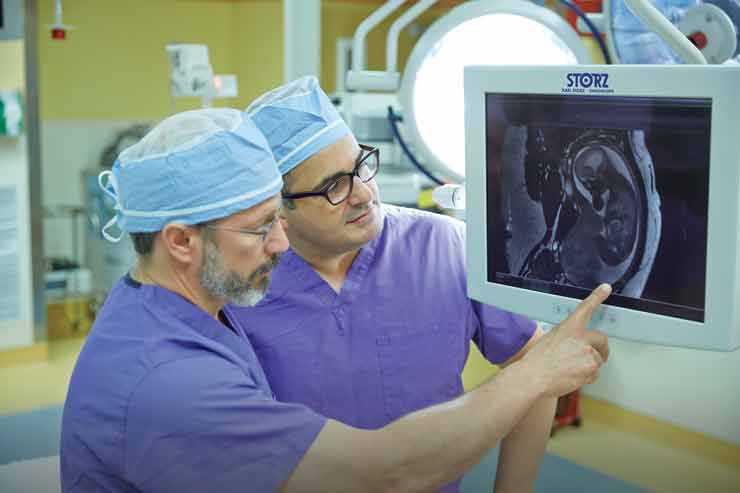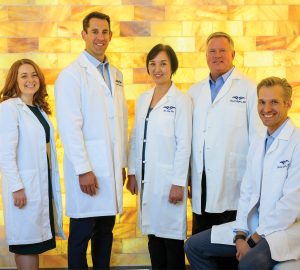Spina bifida is the most common permanently disabling birth defect in the United States, affecting 1 in every 1,000 babies. It occurs when the spinal cord and bones don’t form and close properly during fetal development. One of the most severe types, myelomeningocele (MMC), can cause lifelong disabilities. “Many children born with MMC have varying degrees of lower-body paralysis, and some never walk at all,” says Dr. Mike Vlastos of SLUCare, the physicians of Saint Louis University. “Most kids with the defect need a shunt in their brain to remove excessive fluid buildup from hydrocephalus. The shunt can break, clog or get infected, and sometimes needs to be replaced.”
In the past, the only way to treat MMC was to perform surgery after the baby’s birth. But damage to the spinal cord and nerves often worsened throughout the mother’s pregnancy. “Now, thanks to a groundbreaking in-utero surgery advanced at St. Louis Fetal Care Institute at SSM Cardinal Glennon Children’s Medical Center, babies with MMC can be operated on before they’re born, with much better results,”says Vlastos, director of the Institute and assistant professor of maternal-fetal medicine at SLU School of Medicine.
The institute was one of the first in the country to offer the procedure after results of the MOMS (Management of MMC) trials, sponsored by the National Institutes of Health, were released in 2011. It’s now one of only 10 centers in the country performing the surgery, and the only one in the Midwest. “Fetal MMC repair helps reduce or eliminate major complications associated with the defect,” says SLUCare’s Dr. Samer Elbabaa, Reinert chair pediatric neurosurgery, associate professor of neurosurgery and director of pediatric neurosurgery at SLU School of Medicine and SSM Cardinal Glennon Children’s Medical Center. “More than 80 percent of babies need a brain shunt with standard postnatal surgery, but prenatal repair reduces that need by half. Most also experience increased spinal cord function, resulting in less paralysis in the lower body.”
The procedure, performed at SSM St. Mary’s Health Center by Vlastos, Elbabaa and their team, takes place 19 to 26 weeks into the pregnancy. Making a bikini-line incision similar to that used for a Caesarian section, Vlastos repositions the baby to reveal its lower back. Elbabaa, using intricate microsurgical techniques, closes the covering of the baby’s spinal cord. Then Vlastos repairs the womb. The entire procedure takes between three and four hours. “We’ve done 35 surgeries in three years, making us one of the fastest-growing, most experienced programs in the country,” Elbabaa says.
Vlastos and Elbabaa credit SLU, Cardinal Glennon and St. Mary’s for providing the necessary infrastructure and expertise. “The entire team, including our nurses and care coordinators, works together to ensure the best possible outcome for the little ones in our care,” Vlastos says. “We’re dedicated to helping families faced with this difficult diagnosis. What a great feeling, knowing you’re changing the lives of these kids and their families for the better.”
By Tony Di Martino
Photo courtesy of SLUCare
Pictured: Drs. Mike Vlastos and Samer Elbabaa
[St. Louis Fetal Care Institute at SSM Cardinal Glennon Children’s Medical Center, staffed by SLUCare physicians, was among the first in the country to repair severe forms of spina bifida in utero. For more information, call 314.977.4440 or visit slucare.edu/spinabifida.]








